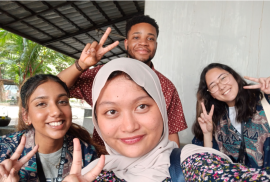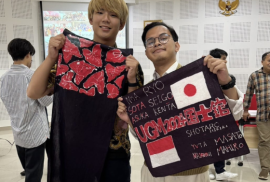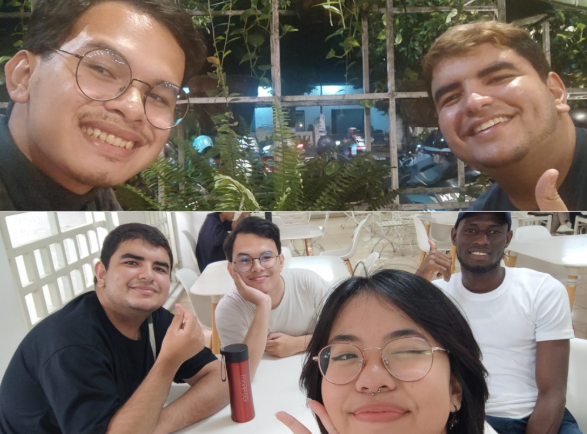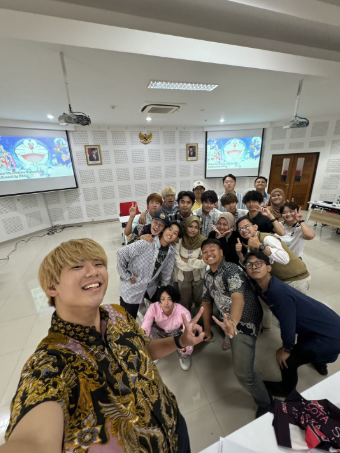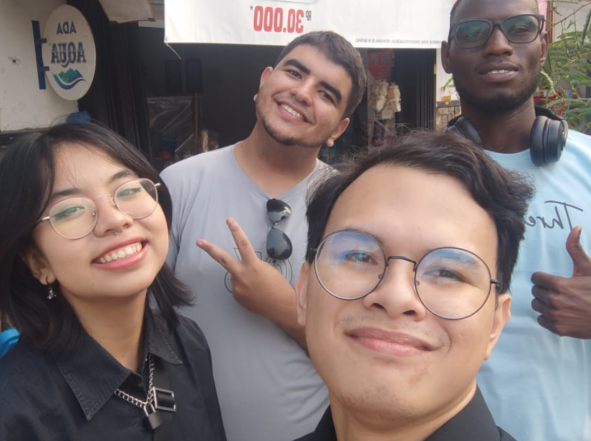Yogyakarta, 12/06/2025- The phrase “Language is a window to the world” may sound simple, but for Khoirunisa Diah Pranata, a student of the Indonesian Language and Literature Program at Universitas Gadjah Mada (Class of 2022), it holds profound meaning. She has experienced firsthand how language is not just a tool for communication, but also a bridge that connects people from different cultural backgrounds, habits, and even ways of thinking. Through her role as a tutor in the Indonesian Culture and Language Service (INCULS) program, Sasa—her nickname—has embarked on a learning journey that is not just about teaching, but also about growing and learning together.
Sasa joined INCULS as a tutor in 2024. Her interest stemmed from her passion for interacting with people from various backgrounds. For her, university life is not only about reading books and completing academic assignments, but also about real-life experiences that broaden one’s perspective. “When I meet and speak with international students, I feel there’s a two-way learning process happening. I learn about them, and they learn about Indonesia,” she explained. Thus, being a tutor is more than just an informal teaching role—it’s a meaningful position that brings together people and cultures.
During her time as a tutor, Sasa supported several programs such as the Kokushikan University program (Japan), the 2025 Developing Countries Partnership (KNB) scholarship program, and a program from Monash University (Australia). Among all her experiences, Sasa found her most memorable moments with Shotaro, a student from the Kokushikan program. Shotaro was not only active and open-minded but also had a strong curiosity about Indonesian culture and social life. “We often had discussions, not just about vocabulary or grammar, but also about food, music, and daily habits,” Sasa recalled. To her, Shotaro exemplified how language learning can be a tool for building genuine connections.
Sasa’s tutoring approach is quite unique. She doesn’t stick to formal or conventional teaching methods. Instead, she prioritizes a personal approach. At the beginning of each session, she usually asks light questions like favorite colors, favorite foods, or preferred sports. The goal isn’t just to break the ice but to create a connection through personal interests. When a student’s hobbies or interests differ from hers, she finds common ground by connecting them with other students who share similar interests. “I believe language learning can be more effective when it starts from things that are close to everyday life,” she said.
One of the techniques Sasa often uses is flashcards, especially for introducing vocabulary related to objects, fruits, or colors. Visual aids such as picture cards have proven effective, especially for students who are not fluent in English. “I once taught a student who was not only new to the Indonesian language but also not very proficient in English. In that case, body language, facial expressions, and images became the main tools for communication,” she explained. In situations like these, Sasa realized that creativity is key to teaching. She also intentionally avoids using overly formal Indonesian to keep the learning environment relaxed and approachable.
Despite its joys, tutoring does come with challenges. One of the main challenges Sasa faced was language barriers. Many students came to INCULS with only very basic Indonesian language skills, and some had limited English proficiency as well. This required Sasa to find creative ways to keep communication flowing. “I have to be patient and read their expressions well. Sometimes they feel shy or lack confidence, which can also hinder their learning process,” she shared. To address this, Sasa employed a more personal approach. She wasn’t just a tutor in class but also a friend outside of it. She greeted students when passing by, engaged in casual conversations, and even accompanied a student to see a doctor when they were ill.
This experience was not only a learning process for the students but also had a significant impact on Sasa’s personal growth. She feels that she has become more open, communicative, and willing to try new things. “Being a tutor often made me reflect on my own understanding of Indonesia. Sometimes when students ask questions about things I consider ordinary, I feel challenged to explain them in a simple and understandable way,” she said. From this experience, Sasa realized that understanding one’s own culture is a vital part of being a language instructor.
Even with her best efforts, Sasa recognizes that tutoring is not something one can do alone without support. She emphasizes the importance of training for INCULS tutors, especially in teaching strategies and intercultural communication ethics. “We need more references and guidance, especially in responding to critical questions from international students. We don’t want misunderstandings, especially when explaining cultural habits or social systems in Indonesia,” she said. She also suggested that INCULS should provide more dedicated spaces to support the intensive teaching of the Indonesian language, creating a more conducive learning environment.
Despite all the challenges, Sasa expressed her gratitude to INCULS for providing her with a space to grow. “Thank you for being a true learning environment, a place to practice what it means to be Indonesian, and a place to grow. I hope INCULS continues to improve, expands its reach, and remains a healthy and inclusive platform for intercultural learning. I also wish the lecturers and staff continued health and success in carrying out their responsibilities,” she said sincerely.
Sasa’s experience as a tutor at INCULS is a small glimpse into a larger ongoing process: how language can become a unifying force, how learning can be a two-way journey, and how diversity is not just a challenge, but a source of richness. Experiences like hers are essential stepping stones toward building a global society that embraces mutual understanding, respect, and shared learning.
[INCULS UGM]

